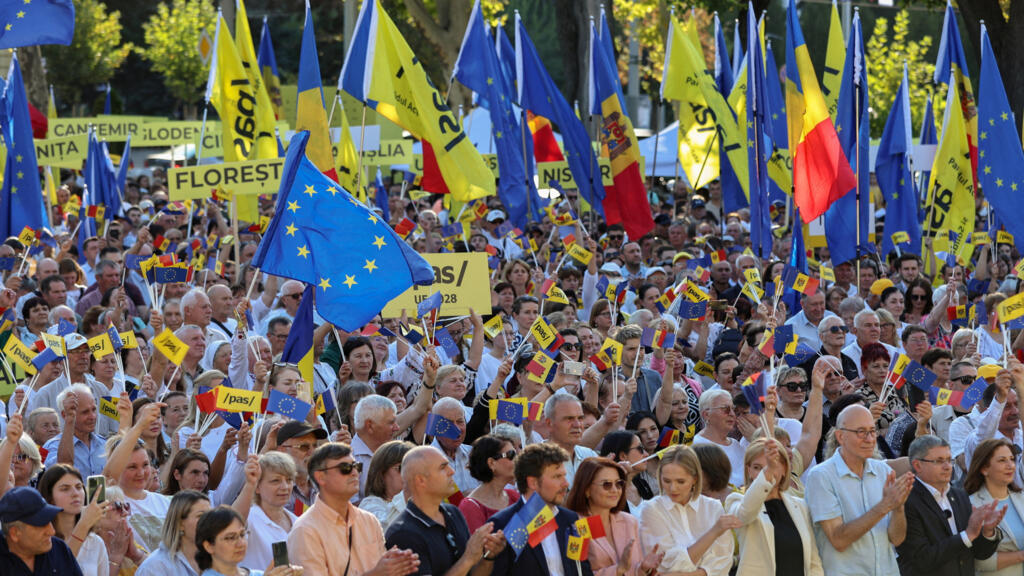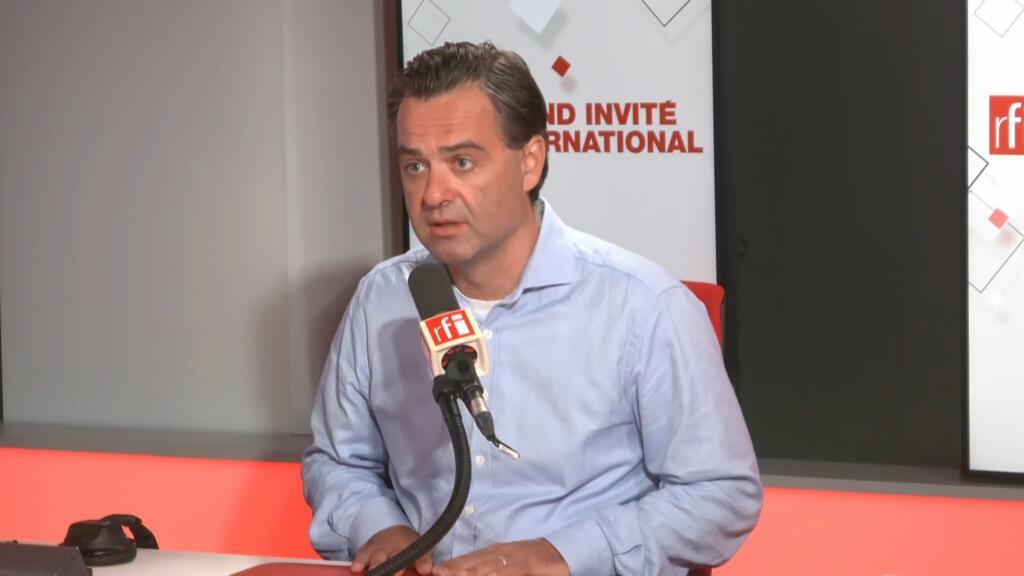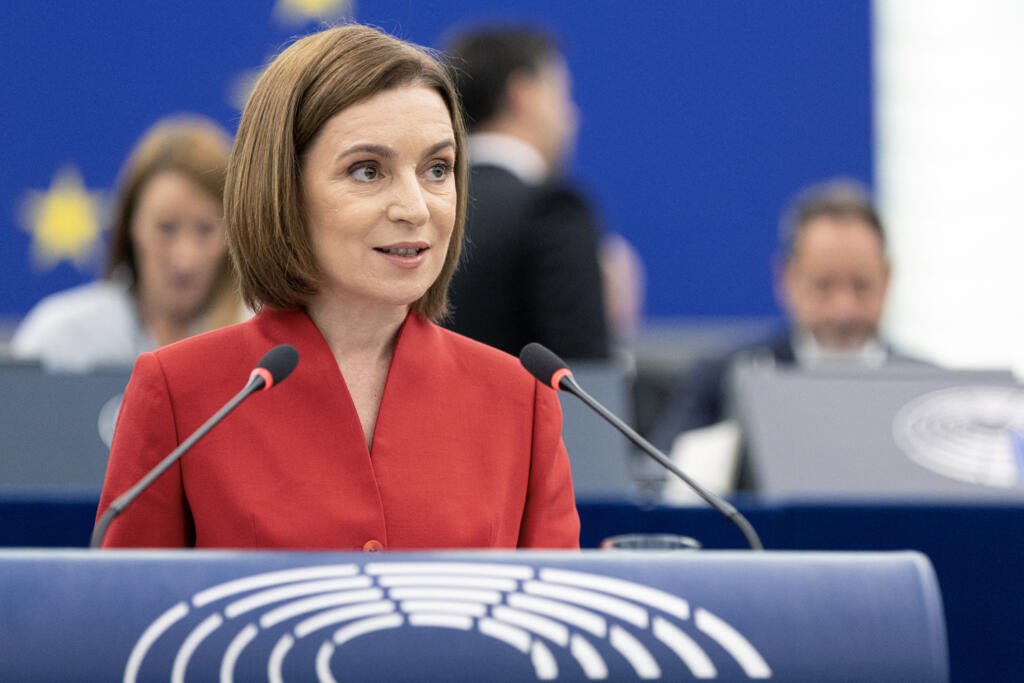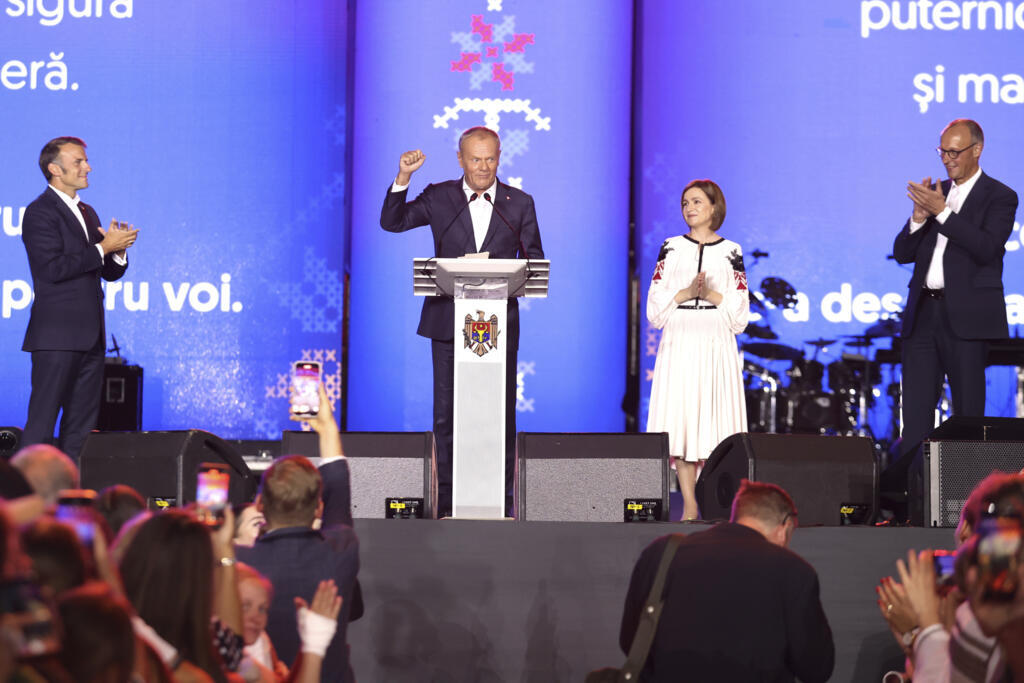
Under mounting pressure from Russian interference, Moldova faces a critical test of its democracy with parliamentary elections on 28 September. RFI spoke to Nicu Popescu, the country’s former deputy prime minister and foreign minister, who is running for parliament on the list of the pro-European Action and Solidarity Party.
Popescu served as foreign minister in 2019, then as deputy prime minister and minister for foreign affairs between 2021 and 2024, when he resigned citing personal reasons.
He is now co-director of the European Security Programme and distinguished policy fellow at the European Council on Foreign Relations, as well as an associate professor at Sciences Po Paris.
In July, he announced that he would be re-joining the Action and Solidarity Party (PAS) and standing in the election in September, which he called "the most important in the recent history of the Republic of Moldova".
Despite the shadow of Moscow looming large and the economic shock of the war in Ukraine, Popescu tells RFI he remains confident that Moldova will uphold stability and maintain its pro-European direction.

RFI: How stable is Moldova's democracy at the moment?
Nicu Popescu: Moldova has had an uninterrupted democratic track record since its independence in 1991. That’s 34 years of orderly, calm, democratic changes of government. So, Moldova has a good record.
But it is also true that in recent years, in the context of Russian aggression against Ukraine, the shocks and pressures on Moldova have increased dramatically. Moldova has nevertheless maintained peace, stability, and its democratic process.
In recent years, presidential elections were complicated, but nonetheless reconfirmed Moldova's democratic functioning. I am sure the same will happen this time.
So, yes, the pressures are there. There is a lot of Russian interference through illegal party financing. Russia switched off gas supplies a few years ago. But Moldova has found solutions to stay the course, to preserve stability and to remain democratic until now. And I am sure it will continue to do so.
RFI: What could the Moldovan government do better to counter Russian disinformation?
NP: Disinformation is a large-scale attempt to influence and sway voters in many countries. It mostly comes through digital tools and digital means, and we have seen Russian interference in France, the UK, Central Europe, Romania – and many others.
That is also happening in Moldova. There are large-scale operations on TikTok and other social media which are essentially strengthening and amplifying the messaging of pro-Russian political players.
'Unprecedented interference': how Russia is attempting to shape Moldova’s future
Besides that, there is a lot of non-digital interference. The Russians have been trying to buy votes on a large scale. Last year, roughly 140,000 people from Moldova – representing around 10 percent of the normal electorate – received Russian bank cards, and many of them were paid through these cards in order to vote as instructed by Russia.
There have been multiple instances of large amounts of cash being seized from pro-Russian political activists. In just one day in April 2024, for example, at Chisinau airport, police detained people trying to bring in roughly €1 million in cash.
So there are many attempts to buy votes and to finance political operatives, journalists, and influencers with vast amounts of completely illegal money. This is a wide spectrum of activities that Russia has been undertaking – and they are completely illegal, going well beyond the digital sphere.
RFI: Moldova received European Union candidate status on 22 June. What progress has been made since then?
NP: In 2023, the European Commission assessed that Moldova had demonstrated very good progress on eight of the 35 chapters, which at the time placed Moldova among the EU candidate countries with the fastest rate of adoption of the Acquis Communautaire.

Moldova has made significant progress towards energy independence and the green transition. Throughout most of the summer, about a third of Moldova’s energy came from renewable sources – wind and solar power. On some days, Moldova even covered 100 percent of its electricity needs from renewables, which is a good rate by European standards.
There has also been significant progress in infrastructure development, including road building in villages. Many villages still need better access to drinking water, and there have been hundreds of projects with concrete benefits for the population, upgrading Moldova’s infrastructure [to be] closer to EU standards.
RFI: When Ukraine wanted to sign a trade deal with the EU in 2013, Russia was fiercely against it. How do you think Russia will react if Moldova joins the EU?
NP: Russian hostility towards Moldova is nothing new. Russia has opposed Moldovan sovereignty and independence since the late Soviet period, from the late 1980s.
Since independence in 1991, Russia has supported separatism in Moldova, maintained an illegal presence in Transnistria, and imposed blockades on dairy products, fruit and vegetables, while using energy as a tool of pressure. With the aggression against Ukraine, the risks have certainly grown.
There have been multiple incidents of Russian drones and missiles transiting Moldovan airspace. Moscow’s energy blackmail has grown. Gas supplies were cut off two years ago, which shocked domestic prices.
But each time Russia sought to pressure Moldova, the country managed to soften the blow by finding alternative markets – with the support of European partners as well as the US, UK, Canada and Japan.
RFI: How does Moldova assess the Russian presence of some 5,000 military “peacekeepers” in Transnistria?
NP: It is clearly important to overcome this separatist conflict. It is also clear that Russia has maintained this illegal military presence since the 1990s, despite having previously committed to withdrawing the troops and weapons by the end of 2002. Moscow has not respected its obligation to withdraw, which is a problem.
At the same time, Moldova has managed to preserve peace, calm and stability around the separatist region. There have not been significant security incidents. The country is at peace. That region is not currently in a tense security situation. Differences with the separatist area are managed through talks, negotiations and peaceful means.
Moldovans living on both banks of the River Dniester have made a real effort since the full-scale Russian aggression against Ukraine three and a half years ago not to import war into Moldovan territory, but instead to resolve their differences peacefully. This must continue.
RFI: To what extent does the Transnistria situation affect the EU accession talks?
NP: It is much better to join the EU without a separatist conflict. At the same time, the EU would not be facing such a situation for the first time. Germany, a founding member of the European Coal and Steel Community, was divided for more than three decades but still co-founded the European project. Later on, there was the case of Cyprus.
Of course, separatist areas always pose problems. But Europe’s history shows there are ways to minimise the impact on the rest of the Union. In the case of Moldova, the hope is that by joining the EU, reintegration of the country will in fact be made easier and more sustainable.
French support, Russian meddling and the fight for Europe’s frontier in Moldova
RFI: French President Emmanuel Macron has been very vocal in supporting Moldova's EU accession. How significant has the French backing been?
NP: France, together with other partners, has played an extremely important role. The Moldova Support Platform, launched by Romania, France and Germany, has been fundamental in keeping Moldova stable economically and in security terms. France’s investment and commitment to Moldova’s peace are deeply appreciated.
Just recently, on Independence Day, 27 August, the Weimar Triangle leaders – the president of France, the chancellor of Germany and the president of Poland – came to Chisinau and spoke to 100,000 people in the city’s main square. President Macron and Polish Prime Minister Donald Tusk addressed the crowd in Romanian, a gesture of respect warmly received by the Moldovan people.

RFI: Are you worried about US foreign policy, given President Donald Trump’s softer line towards Russian President Vladimir Putin?
NP: We have seen many statements, but we have also seen NATO remain strongly committed, with allied states continuing to invest seriously in security and defence. I believe the EU, NATO and the US are now on track to strengthen their shared security capacity and maintain peace in Europe.
It is very clear that Washington wants peace in Europe to be underpinned by greater European investment in defence, which would also allow the US to reposition some of its forces. That is a legitimate and longstanding demand – it predates President Trump. I think the alliance is on track to meet it.
And as long as NATO remains united and militarily modern, it will continue to act as a strong factor for peace in Europe.







